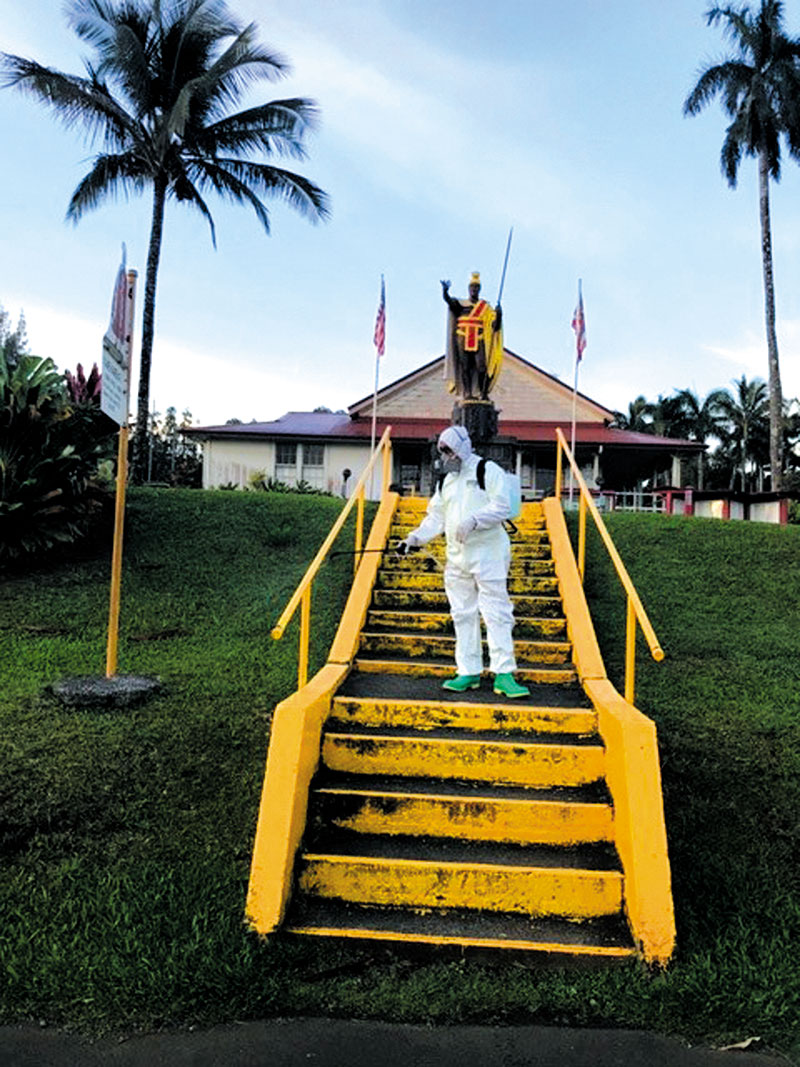Working Together For Hawai‘i
Hawai‘i Island’s prevention and education unit — part of the islandwide COVID-19 task force — has been training individuals, businesses and organizations on how to safely operate during the pandemic.
Over on the Big Island, there’s been a holistic approach to fighting COVID-19 in place since early February — before the disease even made its way to Hawai‘i — when Hawai‘i Mayor Harry Kim and other county officials banded together to start an islandwide task force in preparation.
The proactive stance proved beneficial, and the state’s largest island has been an exemplar for its low case numbers and stellar planning.
“We’ve been doing a great job, but we can’t let our guard down,” says Hawai‘i Fire Department Capt. Garrett Kim. “What we’re seeing across the mainland and even on O‘ahu is that as soon as you let your guard down, you see that spike.”
The overall county task force is made up of a mix of moving parts, including health and wellness, safety, isolation and quarantine sites, childcare, food distribution, bug busters, research and development, prevention and education, and more.
“We’re meeting two to three times a week — virtual, of course, because we’re trying to practice what we preach,” says Kim, with a laugh. “It’s a significant amount of people involved in all departments in the county.”
The overarching task force is made up of virtually every department within the county, and while all elements work together for the common good, the prevention and education constituent is probably one of the most visible. It’s responsible for going out into the community to educate businesses and organizations on best practices for safety and sanitation, as well as being that arm of connectivity to keep people informed. It started by training its own county departments, and then grew to do one-on-one counseling and assistance for businesses. It’s now known as the go-to source for training and education, and in a couple of months has grown to include group coaching sessions for everyone from schools and sports groups to medical facilities, religious institutions and grassroots organizations.
Overseeing that prevention-education segment is Hawai‘i fire Deputy Chief Bobby Perreira, who assumed the position after Deputy Chief Lance Uchida retired last month. His unit is made up of 18 firefighting personnel — firefighters, captains, inspectors, etc. — who help with COVID-related tasks in addition to their regular duties.
“We’re doing a lot of talking on the phone, answering questions, doing training, there’s a lot of that happening,” explains Perreira.
Perreira’s prevention and education task force has been trained to, well, train others. Part of that umbrella includes a Gold Star program that applauds businesses going way beyond the minimum requirements for safe reopening and operations. Gold Star stipulations are more than just what the federal and state governments say are needed to stay open during this time. (Read more about the Gold Star program on page 4.)
“If any resident of the county feels a business is doing a great job, give us a heads up and we’ll do an inspection,” says Kim, who serves as a member of the prevention and education task force. “We’re trying to encourage changes in behavior community-wide.”
While the Big Island has been doing a great job of controlling the spread of COVID-19, there is still much to be done, which rings true for the rest of the state as well.
“We don’t ever claim to be perfect,” says Kim. “But we did a great job and we are striving to get better for everybody here on the island.”
Going forward, as the battle against COVID-19 rages on, the message remains the same: Be vigilant. “We can’t expect to have zero cases,” Kim adds. “But if everyone is doing their part by sanitizing, keeping their distance and wearing face masks, then it won’t become an exponential outbreak like you’re seeing in places like Florida and Arizona.
“We’d hate to have all the sacrifices the community has made be for naught because people are not keeping up with their safety measures.”
To learn more about the county task force and its COVID-related materials, visit hawaiicounty.gov.
GO FOR THE GOLD
Doing the bare minimum just isn’t enough for a number of island businesses, especially when it comes to safety and sanitation measures. To honor the companies putting forth extra effort to promote the well-being of the community, the County of Hawai‘i is awarding Gold Stars to those who have not only adhered to the safety requirements set up by the CDC and state, but also have met additional essentials established by the county, including providing disposable masks for customers in need, separating entrances and exits, utilizing one-way aisles and staggering parking spaces.
Current outstanding companies include KTA (Puainako, Waimea, Waikoloa, Captain Cook and Kona), Safeway (Kona and Hilo), Restaurant Osaka, First Hawaiian Bank in Kona, Bank of Hawaii in Pauahi, Sakura Sushi and Grill, and more. Recommendations are always welcome, too. Locals who see a business going above and beyond in terms of safety and well-being for its customers and employees can call 961-8665 or 935-0031, or visit hawaiicounty.gov/goldstar.






